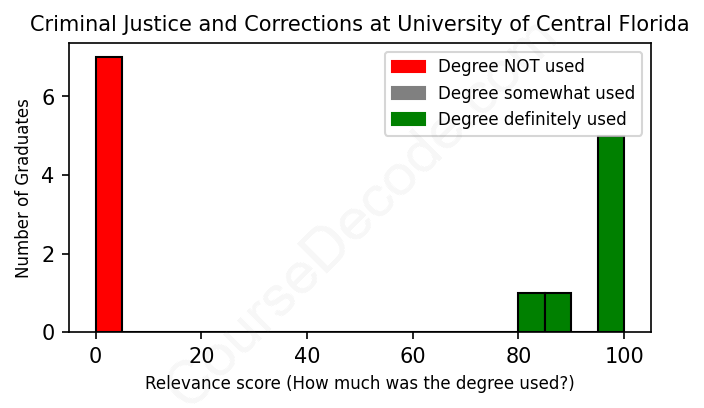
First, some facts. Of the Criminal Justice and Corrections graduates from University of Central Florida we've analyzed , here's how many have used (or NOT used) their degree in their career:

These are estimates based on AI analysis of 14 LinkedIn profiles (see below).
The verdict? Significantly below average. Overall, with an average relevance score of 47%, Criminal Justice and Corrections graduates from University of Central Florida have a much lower likelihood (-20%) of finding work in this field compared to the average graduate across all fields:
And for comparison, here's the chart for all profiles we've looked at across all degrees.
Also, after graduating, only 14% of these graduates have pursued further education other than another Bachelor's degree (such as a Masters degree or other), compared to the average across all profiles of 35%. This suggests a Bachelors degree is enough for most Criminal Justice and Corrections graduates, and it's normal to look for work straight after graduation.
See the details:
|
Relevance score: 100% We think this person has gone into a career highly relevant to their degree. We think this person has gone into a career highly relevant to their degree.
DEGREE INFOGraduated in 2019 from University of Central Florida with a Bachelor of Science - BS in Criminal Justice and Corrections. No other secondary education since. JOB HISTORY SINCE GRADUATIONDetention Service Officer Orange County Corrections Dept Aug 2020 - Dec 2021 Certified Correctional Officer  Florida Department of Corrections Feb 2022 - Jul 2022 Detention Deputy  Seminole County Sheriff's Office Aug 2022 - Present ABOUTNo information provided. |
The top 10 most common jobs done by the graduates we've analyzed (ranked most common to least) are:
Based on the LinkedIn profiles of graduates from the University of Central Florida who studied Criminal Justice and Corrections, it seems like there's a pretty mixed bag when it comes to job relevance. Many of them ended up in positions that don't really relate to their degree or the field of criminal justice at all. For instance, a bunch of graduates found themselves working as Customer Service Associates, in construction management, or even as medical sales representatives. These types of roles focus more on sales, customer interaction, and other skills that have little to do with the concepts they studied in class.
On the flip side, there are some graduates who found jobs that are definitely relevant to criminal justice and corrections. Positions like Juvenile Probation Officer, Detention Service Officer, and even Police Officer are prime examples where their education really comes into play. These jobs require an understanding of legal systems, correctional practices, and sometimes even crisis intervention. It seems like while some grads drifted away from the field, others really found their niche and applied what they learned in school to make a difference in the criminal justice system. Overall, it's kind of a 50/50 situation, but those that pursued jobs relevant to their degree seem to be making meaningful contributions in the field they trained for!
Here is a visual representation of the most common words in job titles for Criminal Justice and Corrections graduates (this is across all Criminal Justice and Corrections graduates we've analyzed, not just those who went to University of Central Florida):

Looking at the career trajectories of graduates from the University of Central Florida who studied Criminal Justice and Corrections, it’s clear that many are finding their way into roles that directly relate to the field, while others seem to drift into very different areas. For their first jobs out of college, many graduates are stepping into positions like juvenile probation officers, correctional officers, and roles in law enforcement, which is pretty promising for someone looking to establish a career relevant to their degree. For instance, several graduates from 2016 and 2019 got right into work as detention service officers or intelligence analysts, showing that the foundation they built at UCF is leading them toward meaningful positions in the field they studied.
However, the trend shifts a bit when you glance five or ten years down the line. While some of the earlier graduates have continued to flourish in their fields, others have moved on to unrelated careers—like medical sales or even cutting hair. Graduates from 2014 to 2021 show a mix of staying within the criminal justice arena and branching out into diverse territories, with some moving to roles like legal assistants or even working at a theme park. It’s a mixed bag; some folks have found their passion and stuck to the path, while others might have taken a turn away from what they originally aimed for. Overall, while there are definitely strong cases of successful, relevant careers, there's also a sizable number of graduates who have ended up in jobs that don't seem related to their education, reflecting the unpredictable nature of career paths after college.
Honestly, a Bachelor’s degree in Criminal Justice and Corrections can be a mix of challenging and manageable, depending on your interests and study habits. At the University of Central Florida, it’s not considered one of the toughest programs out there, but like any degree, it does require some dedication and effort. You'll dive into subjects like criminal law, sociology, and forensic psychology, which can be super interesting if you're into that stuff. If you're willing to keep up with readings, participate in discussions, and maybe even pull some late nights for studying, you should be just fine. Overall, I’d say it sits somewhere around average in terms of difficulty—you’ll definitely learn a lot, but if you’re passionate about the subject, it can be a pretty rewarding experience!
Most commonly, in the LinkedIn profiles we've looked at, it takes people 2 years to finish a Bachelor degree in Criminal Justice and Corrections.
Looking at these graduates from UCF and their job paths, it seems like they’ve landed some pretty varied gigs, which can have a big impact on how much they're making. Some of the roles like police officer and juvenile probation officer tend to pay decently, especially as you gain experience, while others, like certain entry-level positions in retail or service, might not bring in as much cash. The medical sales roles could potentially be lucrative, depending on the company and your ability to sell, but the duplication in job titles raises some questions about job stability. Overall, while some are likely doing alright financially, it looks like others are still figuring things out in terms of salary. So, yeah, it’s a mixed bag!
Here is a visual representation of the most common words seen in the "about" section of LinkedIn profiles who have a Bachelor degree in Criminal Justice and Corrections (this is across all Criminal Justice and Corrections graduates we've analyzed, not just those who went to University of Central Florida). This may or may not be useful:

Here are all colleges offering a Bachelor degree in Criminal Justice and Corrections (ordered by the average relevance score of their Criminal Justice and Corrections graduates, best to worst) where we have analyzed at least 10 of their graduates:
| College | Score | Count |
|---|---|---|
 American Military University American Military University
|
52 | 13 |
 Bridgewater State University Bridgewater State University
|
50 | 13 |
 University of Central Florida University of Central Florida
|
47 | 14 |
 University of North Texas University of North Texas
|
47 | 14 |
 University of Phoenix University of Phoenix
|
41 | 23 |
 University of Cincinnati University of Cincinnati
|
41 | 12 |
 Sam Houston State University Sam Houston State University
|
35 | 22 |
 John Jay College (CUNY) John Jay College (CUNY)
|
35 | 12 |
 Ferris State University Ferris State University
|
34 | 14 |
 Florida International University Florida International University
|
31 | 17 |
 Liberty University Liberty University
|
31 | 10 |
 California State University-Sacramento California State University-Sacramento
|
24 | 14 |
 Colorado Technical University Colorado Technical University
|
24 | 16 |